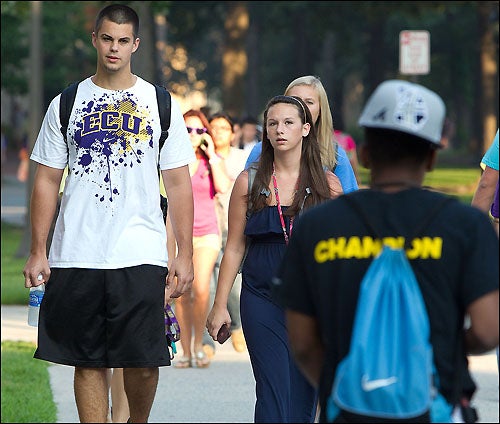Student-learning assessment: ECU conversation continues
Grades don’t tell the whole story.
That fundamental principle, say top academic officials at East Carolina University, is driving a push to improve how faculty and staff assess student learning.
Effective assessment of student learning goes hand in hand with demonstrating accountability to a diverse audience deeply invested in how well the university meets student-learning outcomes, said David Weismiller, associate provost for Institutional Planning, Assessment and Research. He said the university is accountable to students, parents and faculty as well as the federal government, which contributes billions of dollars toward higher education.
Accountability also plays a role in whether the university receives reaffirmation of accreditation from SACS, the Southern Association of Colleges and Schools. ECU’s next SACS reaffirmation visit is scheduled for 2013.
While reaffirmation of accreditation is critical, Weismiller said he expects faculty and staff at ECU will “set the bar higher for student success on our own, not just to meet external standards.”
“We should do this because we care, not because somebody’s coming to visit,” he said.
Setting the bar higher is at the center of an upcoming conversation on student-learning assessment – ECU Assessment Day, scheduled for 9 a.m. to 3:15 p.m. Sept. 23 at the East Carolina Heart Institute. Assessment Day features, among others, Belle Wheelan, president of the SACS Commission on College.
Wheelan is the first African American and the first woman to serve as SACS president. Her 30-year career includes roles in faculty, student services and campus administration as provost and college president. She holds a doctoral degree in educational administration from the University of Texas at Austin, a master’s in developmental education psychology from Louisiana State University and a bachelor’s degree from Trinity University in Texas.
Wheelan will also speak on assessment and accreditation at a meeting of the ECU Board of Trustees that day.
ECU Provost Marilyn Sheerer said that assessment “has always been a critical part of the academic environment. With today’s emphasis on accountability in the academy and the ever-increasing demand for use of assessment results in improving the learning environment, the Assessment Day event is one of utmost importance to us all.”
The university is striving toward what Weismiller terms a “mature assessment system,” which moves beyond acquisition of data. “Mature assessment is when we have the conversation about what the data means, what has been successful and how we take this information forward and use it to inform program decisions,” he said.
ECU has been focusing a concerted effort on assessment since about 2007, Weismiller said. Meetings with faculty identified a desire to continue the conversation, which led to development of the Assessment Day forum.
The forum will include presentations by assessment leaders on a national and university level, as well as examination of best practices at ECU through poster presentations and peer discussion. Faculty and staff can learn from experts and from each other, sharing best practices and gathering ideas from what has worked in other ECU units.
“Everything we do at East Carolina University should be about student success,” Weismiller said.
An A-minus or B-plus cannot adequately express student success. The grade does not show how well a student has learned to apply critical thinking, collaborate within a group or succeed in a leadership role. For that reason, assessment of student learning at East Carolina University extends well beyond a letter grade. It is an ongoing process in which faculty and staff consider best practices on how to obtain, evaluate and incorporate student-learning data into decisions that improve student learning, Weismiller said.
Sheerer noted that the focus of Assessment Day “will be on sharing – on understanding how we use data and are making changes in response to the evidence relative to student learning and learning outcomes.
“I encourage all who can to attend. It is that important,” Sheerer said.
###
